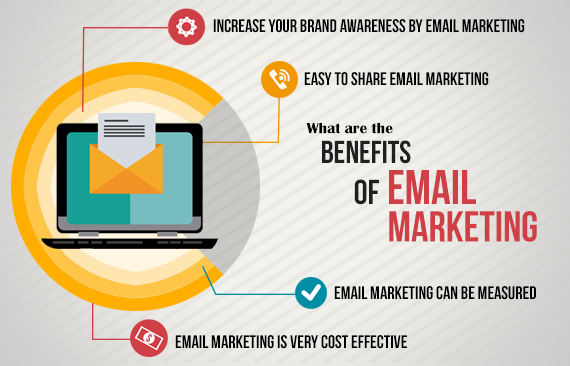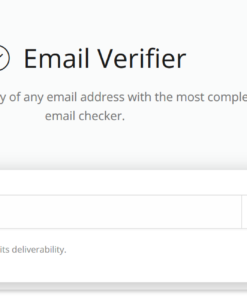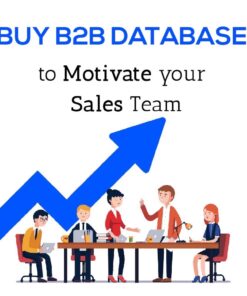Buy Email database, Email marketing database, B2B Email database, Gmail database, Email address database, Email list database
$ 2.00 – $ 5.00
Email databases provide the opportunity to reach out to your customers and prospects with relevant information about your company and special offers for its products as well as other marketing communications.
Buy Email Database, Email marketing database, B2B Email database, Gmail database, Email address database, Email list database.
Search, Order, Download!
Within minutes, you can download a database of contacts and start connecting with your audience.
Unmatched Accuracy
Both automated and manual processes ensure the accuracy of our human-verified lists.
CRM Ready Files
Download your list as a .csv file, integrate it into your CRM, and start networking.
Premium Full Contacts
Contact from every angle by email, phone, postal address, and much more. Don’t miss your chance to make a connection.
International Product Range
Connect with high-level managers at companies in the US, UK, Canada, Europe, Asia, and more.
Affordable Pricing
Quality email lists enable businesses to make B2B connections for an amazingly low price.
Direct Contacts Only
Don’t bother contacting generics (such as contact@). With our lists, you can email real people.
USING EMAIL FOR SALES PROSPECTING
Think like your audience, earn their trust, and convert them to customers
CLOSING NEW DEALS IS TOUGH, RIGHT?
Sarvotarzan gives you the information you need to reach decision-makers in your target market, so you can connect directly with the right people to close more deals.
BUILD YOUR PROSPECT LIST NOW
READY-MADE LISTS
Build your list with our list-builder tool, or buy one of our pre-built contact lists of managers and stakeholders in several industries. Market to your target audience, whether it’s doctors or CFOs. We have more than 100 lists to choose
How Do I Build an Effective Email Database for My Business?
Why Do I Need an Email Database?
Email databases provide the opportunity to reach out to your customers and prospects with relevant information about your company and special offers for its products as well as other marketing communications. It is important to understand why building one is so important to growing a business, there were over 3.8 billion email users in 2018 and this global total is predicted to rise to 4.2 billion by the end of 2022 according to The Radicati Group. Not only are email users a huge catchment but it is also a very direct and personal way of reaching them. It is worth using the range of steps you can take to gather essential email addresses for your database.
Consideration should also be given to the type of information to keep in your database. Using your database to categorise customers can provide valuable insight into your customer base and enhance your marketing campaigns. A good database can be exploited as a marketing tool to help increase your company’s sales while email is a low-cost way to spread the word about your business. With 9 out of 10 marketing professionals polled in the 2015 DMA National Client Report stating that email is ‘important’ or ‘very important’ it’s worthwhile taking time to plan out exactly how you intend to use it to ensure you reap the benefits. Email is described as the workhorse of digital marketing and was consistently ranked as the single-most-effective tactic for awareness, acquisition and conversion in a Gigaom Research paper, and was sited by 56% of respondents as the most effective tactic for retention.
What Is an Email Database?
An email database is a collection or list of the names and email addresses of your business’ actual and potential customers. It can be compiled by collecting the addresses of people who express interest in your company or products and from those who purchase products from you. Email-marketing databases can also be purchased for use in marketing campaigns, but these are generally less useful than emails acquired directly by your company.
The list is generally stored within an email delivery software service or a CRM (customer relationship manager) software program from which bulk emails can be sent.
Why Is an Email Database so Important to My Business?
Email marketing is one of the most effective forms of marketing when measured in terms of conversion rate, that is the number of individuals who receive and view the emails and go on to actually purchase a product or ask for more information about the products or services offered. Adobe Campaign has found that Americans are “practically addicted to email” and that more than half of the millennials they canvassed even check emails from the bathroom and 58% of Americans prefer emails over other marketing touch points This is why making your email database as extensive as possible is crucial: doing so gives you a ready-made audience you can provide with relevant information about sales, special offers, new products and any other information that is likely to drive sales of your products.
Email Marketing is so effective because it provides:
- Better conversion and click-through (CTR) rates than other forms of marketing: Conversion rates and click-through rates help determine the efficacy of online marketing campaigns. Email marketing has consistently outperformed other forms of marketing such as banner ads and social media marketing in this regard. Because consumers are more likely to open and view emails than other forms of marketing, conversion rates are also higher with this form of marketing.
- Longer shelf time: Unlike banner ads, which are only good for as long as you pay to have them up, emails typically attract consumer views for a number of days and even weeks after they are sent out. In addition, even if they aren’t acted on right away, they can be saved for later access.
- Opt–in sign-up: Most email lists consist of consumers who have opted-in in order to receive information about a company’s product offerings. As a result, they represent a group that is more likely to be interested in purchasing a company’s products than consumers reached via traditional advertising efforts.
- Mobile access: With consumers increasingly consuming media on mobile devices, the ability of email marketing to consistently reach this audience helps its success rate. Unlike forms of advertising such as TV or newspapers which are not always easy to access on a mobile device, emails are typically easier to view, improving the success rate corresponding to their usage.
- Repeat business: By regularly staying in touch with your list you encourage customers to continue to do business with your company. Unlike impulse buying, which generally results in short term sales, repeat business from loyal customers provides your business with a steady level of ongoing revenue. Continuous email contact is a proven method of encouraging this type of behaviour.
How to Capture Email Addresses?
There are a variety of methods for adding email addresses to your database. One of the best ways to do so is to add a landing page or other functionality to your website where those who would like to receive further information about your products, special deals and the like can enter their email address. You can also encourage followers of your company on social media platforms, such as Twitter and Facebook, to sign up for your mailing list by directing them to your website via links on those sites.
Email address mailing lists can also be purchased. While these lists generally don’t feature conversion rates as attractive as lists you have built organically, they can be useful if they are chosen to contain addresses of consumers who are likely to be interested in the products your company offers.
Including those mentioned above, methods for capturing email addresses include:
- Website opt-in landing page: Allows visitors to sign up to receive emails from your company, can be located on single or multiple pages, can be timed to pop up after a pre determined period e.g. 5 seconds.
- Competitions and prizes: Offering prizes to incentivise individuals to provide their email information is also a good way to quickly build your email database.
- Social media: Communications on social media such as tweets and Facebook posts containing links to your website or a specific landing page where interested parties can enter their email information.
- Physical sign-up: If your business has a brick and mortar presence or if you have a partnership agreement with a business the sales person can hand out a sign-up sheet or ask customers and prospects for their email address as a why to keep them up to with new products and offerings.
- Purchasing email lists: This is typically the most expensive way to build your email database. However, it does provide a way to quickly add names to your list when necessary. If you choose this route, the following considerations should be taken into account:
- Acquire current emails: Make sure any email list you purchase has a high percentage of current, valid emails.
- Topicality: The more targeted the list the better. Try to acquire emails of consumers who have expressed an interest in the type of products your company offers.
- Opt-in emails: Lists compiled of consumers who have expressed an interest in receiving information should be used whenever possible. Using non opt-in lists increases the chances of being reported as a spammer, even when opt-out links are offered in email marketing communications.
Once you’ve collected emails, you will need to store them in a database which makes it easy to use them in your email marketing campaigns. There are a variety of CRM (customer relationship manager) programs available to do just this covering SME’s to enterprise level, including AWeber, Salesforce to name a few.
What Type of Information Should Go in My Database?
A variety of information helping you categorise and selectively target different groups of prospects should be captured in your database. These include:
- Name
- Address
- Location (City, Post Code, Address)
- Type of products interested in
- Type of products purchased (if relevant)
How Do I Drive Sales from My Email Database?
Once you’ve built your email database it’s time to put it to use. There are a variety of ways you can utilise it to help drive business. These include:
Sales: Let your audience know when a sale is occurring. Consumers love a bargain, and email contact offers one of the most efficient ways to let people know when they have a chance to get one.
Special offers and prizes: Give those on your list a chance to benefit from letting you send them emails. Notify your list that they have a chance to take advantage of a special offer only for those on the list. Or offer prizes for those who take certain actions, such as mentioning your business online, or referring a friend.
Include links: Don’t just tell your list about a sale or special offer, enable them to take part by providing links so they can order your products online.
Provide business updates: Every email communication doesn’t have to revolve around selling product. Notifying your list about important updates and milestones your business has achieved helps keep your audience engaged and increases customer loyalty. This can include things like the debut of a new product, or other important developments. If you publish a company blog you can use your email list to notify your audience when a new blog is published.
Feature customer stories / case studies: Another method of building consumer engagement in, and loyalty to, your company is to provide information about how other customers have made use of your products. This is another soft-sell approach that increases engagement and helps build customer loyalty to your brand.
Building a strong database has been shown to pay dividends and with a raft of new marketing and sales applications being developed, including the rise of Marketing Automation, so keep in mind that in order to capitalise on these exciting technologies you will need to set up an email database and CRM.
Buy Email Database: Unlock the Power of Targeted Email Marketing
Are you looking to expand your business reach and boost your marketing efforts? Look no further! With the advent of email marketing, the significance of a quality email database cannot be understated. In this article, we will explore the benefits of buying an email database, the types of databases available, and how they can be leveraged to fuel your marketing campaigns. So, let’s dive right in and discover the power of targeted email marketing!
Table of Contents
- Introduction: The Importance of Email Marketing
- Understanding Email Databases
- Advantages of Buying an Email Database
- Types of Email Databases
- B2B Email Databases
- Gmail Databases
- Email Address Databases
- Email List Databases
- Ensuring the Quality of an Email Database
- Implementing Email Marketing Strategies
- Segmenting Your Audience
- Crafting Personalized Emails
- A/B Testing and Optimization
- Best Practices for Email Marketing
- Legal Considerations and Regulations
- The Future of Email Marketing
- Conclusion
- Frequently Asked Questions (FAQs)
- Is it legal to buy an email database?
- How do I choose a reliable email database provider?
- Can I customize the email database based on my target audience?
- How often should I update my email database?
- What are some key metrics to measure the success of an email marketing campaign?
1. Introduction: The Importance of Email Marketing
In today’s digital age, email marketing remains a powerful tool for businesses to connect with their target audience. With billions of email users worldwide, it provides a direct and personal means of communication. Email marketing allows you to engage with potential customers, build brand awareness, and drive conversions. By buying an email database, you can gain access to a wealth of prospects and maximize the effectiveness of your marketing efforts.
2. Understanding Email Databases
An email database is a collection of email addresses and relevant contact information. It serves as a valuable resource for businesses seeking to reach out to a specific target audience. Email databases can be obtained through various means, such as lead generation, list building, or by purchasing from reputable providers. These databases can be segmented based on demographics, interests, or industry, enabling you to tailor your marketing campaigns to specific customer segments.
3. Advantages of Buying an Email Database
Targeted Reach:
When you purchase an email database, you gain access to a pool of potential customers who have already shown interest in products or services similar to yours. This targeted reach increases the likelihood of your emails being well-received and generating positive responses.
Time and Cost Efficiency:
Building an email database from scratch can be time-consuming and resource-intensive. Buying a pre-existing database saves you valuable time and allows you to focus on other crucial aspects of your business. Additionally, it can be more cost-effective, especially when compared to alternative marketing methods.
Increased Conversion Rates:
By reaching out to a targeted audience through email, you can deliver personalized and relevant content, increasing the chances of conversions. With the right approach and compelling offers, email marketing has the potential to yield impressive results.
4. Types of Email Databases
1. B2B Email Databases:
B2B email databases consist of email addresses and other relevant information of businesses and professionals. These databases are ideal for companies looking to establish connections with other businesses, foster partnerships, or generate leads in the B2B space.
2. Gmail Databases:
Gmail databases primarily include email addresses of individuals who use Gmail as their preferred email service. These databases can be highly effective when targeting a broad consumer base or specific demographic groups.
3. Email Address Databases:
Email address databases encompass a wide range of email addresses, including those from various email providers. They can be a versatile option for businesses aiming to reach a diverse audience and expand their customer base.
4. Email List Databases:
Email list databases are curated collections of email addresses from specific niches or industries. These databases offer a more focused approach, enabling businesses to target their marketing efforts to specific interest groups or sectors.
5. Ensuring the Quality of an Email Database
While purchasing an email database can be advantageous, it is crucial to ensure its quality and authenticity. Here are some key considerations to keep in mind:
- Source Reputation: Research the reputation and credibility of the database provider. Look for reviews, testimonials, and feedback from other customers to gauge their reliability.
- Data Accuracy: Verify the accuracy and freshness of the email addresses in the database. Outdated or incorrect information can lead to poor deliverability and wasted marketing efforts.
- Opt-In Consent: Ensure that the email addresses in the database have been collected with proper opt-in consent. This helps comply with legal regulations and demonstrates ethical email marketing practices.
6. Implementing Email Marketing Strategies
Once you have a high-quality email database at your disposal, it’s essential to employ effective email marketing strategies to maximize your campaign’s impact. Here are some key strategies to consider:
1. Segmenting Your Audience:
Divide your email database into segments based on demographics, preferences, or past interactions. This allows you to tailor your messages to specific groups, increasing relevancy and engagement.
2. Crafting Personalized Emails:
Personalization is key to successful email marketing. Customize your emails based on the recipient’s name, preferences, or past purchase history. This helps establish a connection and encourages a positive response.
3. A/B Testing and Optimization:
Experiment with different email elements, such as subject lines, call-to-action buttons, or content layout, using A/B testing. Analyze the results and optimize your campaigns based on the data gathered to continually improve your email marketing efforts.
7. Best Practices for Email Marketing
To make the most of your email marketing campaigns, keep these best practices in mind:
- Use a clear and compelling subject line to encourage recipients to open your emails.
- Craft concise and engaging content that provides value to the reader.
- Include a prominent call-to-action (CTA) that directs recipients to take the desired action.
- Optimize your emails for mobile devices to cater to users who access emails on smartphones or tablets.
- Regularly analyze and evaluate the performance of your campaigns to identify areas for improvement.
8. Legal Considerations and Regulations
When conducting email marketing campaigns, it is essential to adhere to legal regulations and best practices. Ensure compliance with laws such as the CAN-SPAM Act (in the United States) or the General Data Protection Regulation (GDPR) (in the European Union). Familiarize yourself with the requirements and guidelines to maintain ethical email marketing practices.
9. The Future of Email Marketing
Email marketing continues to evolve with technological advancements. In the future, we can expect increased personalization, automation, and integration with other marketing channels. Stay abreast of the latest trends and leverage emerging technologies to stay ahead of the competition and drive impactful email marketing campaigns.
10. Conclusion
In conclusion, buying an email database can be a game-changer for your marketing efforts. It provides you with a targeted reach, saving you time and resources while increasing conversion rates. Remember to choose a reputable provider and ensure the quality and legality of the email database you purchase. Implement effective email marketing strategies, such as audience segmentation and personalization, to maximize the impact of your campaigns. Follow best practices and stay compliant with legal regulations to maintain ethical email marketing practices. As email marketing continues to evolve, embracing new technologies and trends will keep you at the forefront of this powerful marketing tool. So, unlock the power of targeted email marketing by investing in a quality email database today!
11. Frequently Asked Questions (FAQs)
1. Is it legal to buy an email database?
Yes, it is legal to buy an email database as long as the data has been collected with proper opt-in consent and you comply with relevant laws and regulations governing email marketing practices.
2. How do I choose a reliable email database provider?
When choosing an email database provider, consider their reputation, customer reviews, and data accuracy. Look for providers with a track record of delivering high-quality and up-to-date email databases.
3. Can I customize the email database based on my target audience?
Yes, many email database providers offer customization options. You can choose specific demographics, interests, or industry criteria to tailor the email database to your target audience.
4. How often should I update my email database?
It is recommended to update your email database regularly to ensure accuracy and improve deliverability. The frequency of updates may vary depending on factors such as the nature of your business and the rate of data changes in your target market.
5. What are some key metrics to measure the success of an email marketing campaign?
Key metrics for measuring the success of an email marketing campaign include open rates, click-through rates (CTRs), conversion rates, bounce rates, and unsubscribe rates. These metrics provide insights into the engagement and effectiveness of your email campaigns.
| Type | Custom Database Requirements (Per 100 Queries), Custom Email Database of 1000 Emails (Indian / USA / Worldwide), Funders / Venture Capitalists (USA) Email Database of 1000 Emails |
|---|
Be the first to review “Buy Email database, Email marketing database, B2B Email database, Gmail database, Email address database, Email list database”
You must be logged in to post a review.
Related products
On-Page SEO
Buy Website Optimisation Service of Website Speed, Page Speed Score, Y-Slow Score, Fully Loaded Time
Email Marketing






Reviews
There are no reviews yet.